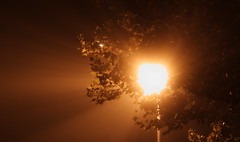http://blogs.wnyc.org/radiolab/2009/06/15/stochasticity/
This program, as all the RadioLab programs, creates an entertaining and interesting hour out of some pretty arcane ideas.
Our brains find patterns in whatever happens. Our entire system is designed to not only handle, but to create a meaningful existence out of random processes, both within and without. Thus, random events that are actually quite probable seem miraculous when they happen to us. It's a matter of perspective.
A golfball flies down the fairway. What are chances that it's going to hit a blade of grass? From the ball's perspective, 100%. From any given blade's perspective, nearly zero. As it is crushed, the poor blade thinks, "that was a miracle!" when it was nothing of the sort.
Our brains have no choice but to take things from our perspective and try to understand them. Many fairly common events feel so rare as to be beyond belief simply because we perceive them like that fairway blade of grass.
In other places (Sorry, the reference escapes me at the moment), I've read evidence that our brain creates "agency" out of what it perceives. This is the idea that we ascribe whatever events we perceive to the actions of some agent, actor, or person. Creating this agent behind the scenes helps us model the universe in terms familiar to us - stories about people. It allows us to leverage all the other parts of our brains that are optimized to understand our fellow humans, the parts that help us read their faces and their body language, that can read and predict human emotions and intentions faster than we can consciously think, that are intrinsically familiar with familial and tribal society and politics. And modeling our universe helps us predict things - making it easier to find food and mate.
Taken together, these ideas combine to create a slippery effect: we take commonplace occurrences and not only think they are miraculous, but that there is something or somebody behind them, making them happen especially to us. Somebody that, no matter how powerful they must be to have such an effect on the world, we still perceive as very human.
I've told this story hundreds of times. I once was driving around in an enclosed parking garage, looking for a place to park. It was late in the morning commute and all my co-workers had already arrived and filled up all the spaces. Suddenly, all the orange sodium vapor lights in the low-ceiling garage flickered and went out. All of them were dark, except the one above the last remaining empty space. I quickly pulled into the space. Then all the lights flickered back on. It felt like somebody had guided me to where I needed to be by turning all the lights but one off and then, when I was safely parked, they turned all the lights back on. I got goosebumps. I had the overwhelming feeling that somebody was watching me. I looked around to see if there was anybody there, but I was alone.
I told a co-worker the story, stressing how I felt at being directed to a spot after having driven around and looked for so long. He pointed out that sodium vapor lights were pretty flakey and all the other lights were probably ever-so-slightly warmer than the one above the empty space, due to the recently-parked cars beneath them. There might have been some sort of momentary power outage, he said, and they all went out for a short period of time while the cold light stayed lit. Like all sodium vapor lights, they came back on slowly. All completely understandable. Nothing mysterious here. Move along.
I was mad at him for spoiling the magical nature of the story for me. I felt sorry that he was so rooted in his literal version of reality that he insisted in finding a mundane explanation when clearly it was something greater and more mysterious than that. Now, however, I can see his interpretation of the story. My emotional response to the event is still comforting to me, but his rational one, though fascinating, is cold and clinical.
What is even more interesting to me is that, every time I have told this story, again stressing the feelings I had of being watched over and taken care of, the person listening nods their head and volunteers a similar anecdote. We've all had experiences where it felt like some unseen force or being was acting in a miraculous way. It is built in to us, apparently at the neural level, to think that there is somebody behind events. We have names for these beings who mysteriously turn the unseen cranks of reality, from the all-mighty "God" to the more secular "Fate" to the more mundane and mortal "Illuminati". It is comforting when we think that they have our interests at heart, and deeply troubling when we suspect that they do not.
In the end, they may not even be there. The universe may simply be a random and callous place. Is that the most troubling idea of all?
Tuesday, June 16, 2009
Tuesday, June 09, 2009
Getting a grip, in public
'Trying a new experiment, inspired by the Eat Like Me blog (which I heard through the Washington Post's Checkup column.).
I know that
Let's see if I can keep it up.
I know that
- Keeping a food log and
- Doing so obsessively
- Eat lots (and I mean lots) of vegetables and fruits, but
- Eat less than you burn, through
- Exercise, primarily through fast walking and strength training.
Let's see if I can keep it up.
Subscribe to:
Posts (Atom)
